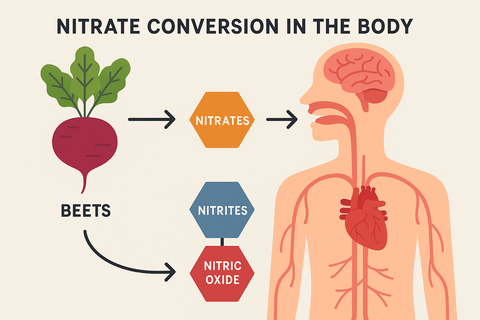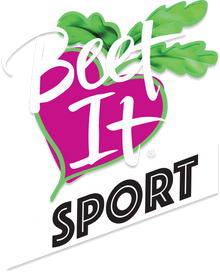
Do Beets Have Nitrates? What Science Really Says
Beets have become a star in the world of health and fitness. From smoothies to energy shots, this deep red root vegetable has taken centre stage for its surprising benefits....
Beets have become a star in the world of health and fitness. From smoothies to energy shots, this deep red root vegetable has taken centre stage for its surprising benefits. But why are so many athletes and health enthusiasts obsessed with beets? The answer lies in their unique nitrate content.
Nitrates in beets have been shown to support heart health, boost endurance, and even improve brain function. Yet, some people worry about potential risks, such as whether these nitrates might cause cancer.
In this article, we'll explore do beets have nitrates, what they do in your body, their health benefits, and address common concerns. You'll also learn how to include them in your diet safely and efficiently.
Do Beets Really Contain Nitrates?

Let's get straight to the point: Yes, beets are high in nitrates.
Nitrates are naturally occurring compounds found in many vegetables, especially in leafy greens and root vegetables like beets. These compounds are a key reason why beets have gained popularity as a "superfood."
When you eat beets, the dietary nitrates they contain enter your bloodstream. The body then uses them to produce nitric oxide, a molecule that plays a vital role in various physiological processes.
Nitrates in beets are among the highest compared to other vegetables. Spinach, arugula, and celery also contain nitrates, but beets stand out because of their higher concentration and the ease of incorporating them into juice and supplement forms.
Whether you ask do beets have nitrates or is there nitrate in beets, the answer is a definite yes. This nitrate content is precisely what gives beets their powerful health-promoting effects.
How Do Nitrates in Beets Work in the Body?

Conversion to Nitric Oxide
When you consume beets and nitrates, your body doesn't stop at nitrates. The real magic happens after ingestion.
Here's what happens:
- Nitrates in beets are first converted into nitrites by bacteria in your mouth.
- These nitrites travel to your stomach and eventually get converted into nitric oxide (NO).
- Nitric oxide then helps widen blood vessels, improve blood flow, and support oxygen delivery throughout your body.
This process is crucial for athletes and active individuals, as nitric oxide supports improved endurance and faster recovery.
Many people also wonder, do beets have nitric oxide directly? The answer is no — they don't contain nitric oxide directly, but help your body produce it efficiently. You might also hear about nitrous oxide in beets, but that’s a common confusion; nitrous oxide (laughing gas) is entirely different from nitric oxide.
So next time you think about beetroot and nitrates, remember — it’s all about your body's ability to convert those nitrates into beneficial nitric oxide.
Benefits of Nitric Oxide from Beets
Nitric oxide is a powerful molecule with widespread benefits:
- Improved blood flow: Helps transport oxygen and nutrients more efficiently to muscles and organs.
- Lower blood pressure: By relaxing blood vessels, nitric oxide helps reduce hypertension naturally.
- Enhanced endurance: More efficient oxygen delivery can help you perform better during workouts.
- Cognitive support: Better circulation may support brain health and mental clarity.
With beet juice nitrates or whole beets, these benefits become accessible and noticeable, especially for those engaged in physical activities or looking to improve heart health.
In short, beets high in nitrates offer a natural way to increase nitric oxide levels in your body, promoting overall wellness.
Health Benefits of Beet Nitrates

Athletic Performance and Endurance
Beetroot has become popular among athletes for a reason — it’s a natural, powerful way to enhance endurance and overall performance. The high nitrate content in beets converts into nitric oxide, which improves oxygen delivery to muscles and enhances exercise efficiency.
A variety of studies have shown that beet supplementation can boost stamina and improve time to exhaustion in both elite and recreational athletes. Moreover, new research by Nieman et al. (2024) in Frontiers in Nutrition shows that beet supplementation also mitigates post-exercise inflammation, promoting faster recovery and supporting overall athlete health. See the full study here.
This makes beets not just a pre-workout superfood but also an excellent recovery aid, helping you stay strong and resilient workout after workout.
Cardiovascular Health
Beets are widely recognized for their positive impact on heart health. The nitrates found in beets help dilate blood vessels, reduce arterial stiffness, and lower blood pressure — all crucial factors in maintaining cardiovascular wellness.
In fact, a recent 2024 clinical study by Spicuzza et al. published in Frontiers in Nutrition demonstrated that just seven days of dietary nitrate supplementation significantly improved macrovascular function in postmenopausal women. This evidence underscores how powerful beet-derived nitrates can be in supporting healthy circulation and overall heart performance. Read the study here.
Whether you’re concerned about long-term heart health or want to support daily cardiovascular efficiency, beets are an excellent addition to your diet.
Cognitive and General Wellness
Improved blood flow from beet nitrates isn’t limited to muscles and the heart. It also supports brain health.
Better circulation means better delivery of oxygen and nutrients to the brain, which may improve focus, memory, and cognitive function.
Some studies even suggest potential benefits for older adults at risk of cognitive decline.
Incorporating beets high in nitrates into your routine can be a simple step toward a sharper mind and better overall vitality.
Read Also: Beets Nitrous Oxide: Natural Fuel for Endurance & Athletic Power
Are Nitrates in Beets Bad for You?
A common question: Are nitrates in beets bad for you?
The short answer is no — when consumed from natural sources like vegetables, nitrates are not harmful.
Natural vs. Processed Nitrates

It’s crucial to understand the difference between nitrates in vegetables and nitrates in processed meats.
In processed meats, nitrates and nitrites are used as preservatives. Under certain conditions (like high heat), these can form harmful compounds called nitrosamines, which have been linked to cancer.
On the other hand, nitrate beets and other vegetables come with antioxidants, vitamins, and polyphenols that protect against nitrosamine formation.
This is why the cancer concerns about beetroot nitrates are largely unfounded.
Cancer Risk Clarified
You might see articles questioning whether beets cause cancer or whether beetroot nitrates pose cancer risks.
Scientific evidence shows that nitrates from vegetables do not increase cancer risk. They're associated with numerous health benefits.
Vegetable nitrates are considered protective rather than harmful because of their nutrient-rich profile.
If you're asking, does beets cause cancer? Current research strongly suggests they do not.
Read Also: 7 Best Foods Rich in Nitric Oxide That Boost Endurance Naturally
How Much Beetroot or Beet Juice Should You Consume?
When adding beetroot nitrate to your diet, moderation is key.
Most studies use about 250–500 ml of beet juice per day, or one to two medium-sized beets.
Some possible side effects include:
- Beeturia: Pink or red urine, which is harmless.
- Digestive upset: Some people may experience mild bloating or stomach discomfort.
If you’re new to beet root nitrates, start with smaller amounts and gradually increase.
For athletes, drinking beet juice 2–3 hours before exercise appears most effective for performance boosts.
Beetroot Juice vs Whole Beets: Which is Better for Nitrates?

When it comes to beet juice nitrates versus whole beets, both have their advantages.
Whole beets:
- Higher in fiber.
- Slower release of nitrates.
- Additional nutrients and antioxidants.
Beetroot juice:
- Higher concentration of nitrates per serving.
- Easier to consume quickly.
- Convenient before workouts.
If your goal is general wellness and gradual benefits, whole beets are excellent.
If you want a quick nitric oxide boost before intense exercise, beet juice nitrates are ideal.
For those who find preparing beets tedious, Beet It Organic Beetroot Juice offers a convenient, concentrated source. It provides the same nitrate power in an easy-to-drink shot without peeling, cooking, or juicing.
Try Beet It Sport Nitrate 400 Shot

Eating fresh beets or making beet juice daily isn't always easy — it can be time-consuming and challenging on your stomach.
Beet It Sport Nitrate 400 Shot makes it simple. Each small 70 ml shot packs a powerful 400 mg of natural dietary nitrate to help boost nitric oxide, improve blood flow, and enhance endurance.
Trusted by top athletes worldwide, it's 100% natural, convenient, and Informed-Sport certified for safety.
Shop Beet It Sport Nitrate 400 Shot Now and feel the difference in your performance.
Conclusion
So, do beets have nitrates? Absolutely — and that's precisely what makes them so special.
From boosting athletic endurance to supporting heart and brain health, nitrates in beets offer a wide range of benefits backed by solid science.
Unlike processed meat nitrates, beetroot and nitrates are not linked to cancer risks. Instead, they help improve blood flow, lower blood pressure, and enhance performance naturally.
Whether you eat whole beets, drink beet juice, or opt for convenient products like Beet It Organic Beetroot Juice, incorporating beets high in nitrates into your diet is a smart move for your health and fitness.
Ready to experience the power of beet nitrates without the hassle? Try Beet It Organic Beetroot Juice and feel the natural boost today!


